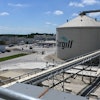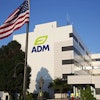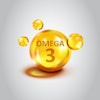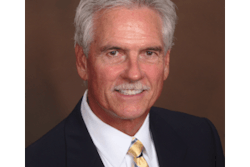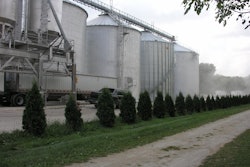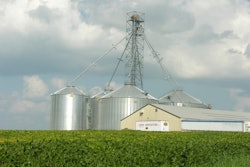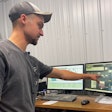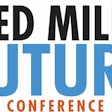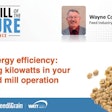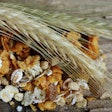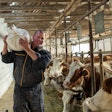Feed industry prepares for better conditions in 2010
By Joel G. Newman
We all know the economy in the United States and around the world was affected profoundly by the economic turmoil of the last one to two years. We likely know family members, friends or others in our communities who have struggled mightily in these times.
The feed industry has not been immune to the difficult conditions. The dramatic escalation of corn prices and other commodity prices in the first half of 2008, combined with the following recession and the onset of the H1N1 influenza virus, took a large toll on the feed industry and our producer customers. All our members have engaged in retooling their business models and unfortunately some have merged or been forced to close their businesses.
Just as our members have done, we at the American Feed Industry Association have adjusted our model and pared back expenses wherever possible. We continue to offer high-quality educational programming, but we have stepped up our efforts to deliver the information and materials our members are accustomed to via webcasts, DVDs and other easier-on-the-budget methods.
However, our leadership on legislative and regulatory issues facing the industry remains a critical component of what we do on behalf of our members, and our focus has expanded to include state, national and international representation. Legislative and regulatory matters are complex and becoming more so each year.
As of this writing in mid-November, it is not easy to look too far into the future and forecast what may unfold in 2010. With the economic recovery unfolding tentatively, both domestically and globally, consumption of meat, milk, eggs and fish is showing signs of improvement. Producers have adjusted production, and increased exports are contributing to improving sales and prices. Most of the 38 countries that banned U.S. pork imports following the discovery of H1N1 here have lifted those restrictions, including China.
I believe that gradually the outlook for our members will become steadier throughout 2010. Demand and hiring will pick up, and bottom lines will improve. We anticipate most of our members and much of the feed industry at large will continue to watch budgets closely and adhere to a conservative business model, as will AFIA.
AFIA’s Safe Feed/Safe Food Certification Program, a significant and proactive industry program, continues to succeed and demonstrate the industry’s commitment to feed and food safety. The number of feed and feed-related facilities that have received certification in the last five years is approaching 400, and I am enormously pleased the members of the National Pork Board’s Pork Safety Committee deemed this exclusive program worthy of their endorsement in 2009. We plan to roll out an international version of the program in the near future, as a result of an alliance between AFIA and the EU Feed Additives and Premixtures Association, also known as FEFANA. I assure you we will continue to foster the Safe Feed/Safe Food Certification Program in various ways in the year ahead.
At AFIA, the only organization that represents the total feed industry, the staff and I are mindful each day of the challenges our members face. The association, founded as the American Feed Manufacturers Association, celebrated its 100th year of service with a Centennial Celebration in 2009. We published a hardcover book, produced a short film, launched a new logo and more to coincide with the anniversary of AFIA’s founding. Through these efforts to reflect on where we have been, we realized anew how our industry has faced great setbacks in previous decades. And with each obstacle, we have summoned our creativity, vision and just plain hard work to come through intact and ultimately stronger. And we will emerge from this current recession as a much stronger industry.
Finally, I pledge we will live up to our “Four Promises” to AFIA members. AFIA will (1) serve as the voice of the total feed industry, (2) provide leadership in the legislative and regulatory arenas, (3) stand ready with confidential expertise as needed, and (4) offer unparalleled member services.
乔尔·g·纽曼是美国的总裁兼首席执行官n Feed Industry Association
Growth a sign of Safe Feed/Safe Food Certification Program
By Keith Epperson and Anne Keller
The American Feed Industry Association launched the Safe Feed/Safe Food Certification Program five years ago to foster the use of the highest safety standards by feed mills and other facilities involved in the manufacture of livestock feed, pet food and related ingredients.
Today the number of facilities in the United States and Canada that are certified by the program is nearing 400, and these facilities represent about 90 companies. We also are pleased with the number of facilities expected to become certified in the next few months. Keep an eye on the program website at www.safefeedsafefood.org to learn when plants receive certification and review other news and information.
A high point for the program in the last year was the endorsement by the Pork Safety Committee of the National Pork Board. This show of support for the program by a key committee of the National Pork Board is most welcome, as it validates the benefits the program has to offer participants and their customers.
The program also continues to receive positive public comments from officials associated with the Food and Drug Administration. Among them, Dr. Dan McChesney, the director of the office of surveillance in the Food and Drug Administration’s Center for Veterinary Medicine, spoke positively of the program’s concepts back in the spring, saying the independent program “surely addresses a lot of the attributes of a proper third-party certification program.” And Dr. Stephen Sundlof, a former director of the agency’s CVM, has said the program is ahead of the curve.
Background and benefits
If you are unfamiliar with the Safe Feed/Safe Food Certification Program, you may wonder why so many facilities are certified, why FDA experts are supportive of it, and what certification entails.
安全饲料/食品安全计划提供的公司and facilities with a relatively straight-forward challenge: If a facility proves to an outside, independent, third-party auditor that it meets or exceeds a series of strict, safety-focused standards set forth in the program, the plant will earn the right to be certified as a program participant. With this achievement comes the ability to promote to customers and others that the facility is a Safe Feed/Safe Food-certified plant.
The program promotes standards that meet or exceed all regulatory standards for the industry, but it also is a comprehensive HAACP-based safety standards program for feed manufacturers and their suppliers and customers.
Joining the exclusive group of certified facilities takes time and effort on the part of a team of individuals at each plant. A well-trained group of employees who complement each other’s efforts is a hallmark of each certified facility.
AFIA staff members regularly receive reports from managers of certified plants that they are pleased to discover the extent to which certification leads to a substantial reduction in shrink and increases overall plant efficiency. Some certified plants are known to receive direct financial benefits in the form of lowered product-liability insurance premiums. And when customers ask whether a plant is Safe Feed/Safe Food-certified because it gives them greater peace of mind, the reason to become involved in the program is even clearer.
International version nearing launch
The existing program is running well, so much so that an international version of the program will launch in the near future. AFIA in early 2009 formed an alliance with the EU Feed Additives and Premixtures Association, also known as FEFANA, to accomplish this mutually beneficial objective. Since then, auditors affiliated with the Facility Certification Institute have received training from FEFANA representatives about how to conduct audits of U.S. facilities to meet the European Commission’s Feed Hygiene Rule. Additional details are being finalized as of this writing in November.
The International Safe Feed/Safe Food Certification Program is expected to launch in the near future with easier importing and exporting of products the clear anticipated benefit of international certification.
Keith Epperson is AFIA’s vice president of manufacturing and training. He also manages the technical details of the Safe Feed/Safe Food Certification Program. Anne Keller, AFIA’s communications director, is responsible for the marketing and promotion of the Safe Feed/Safe Food program.
AFIA actively engaged in legislation, regulations regarding members’ issues
By Richard Sellers and Steve Kopperud
Even the most casual observers of the American political scene cannot have failed to realize members of Congress were focused on issues related to health care and the recession-battered economy in 2009. Whether or not you agree with the way the debate and legislative activity surrounding the issues unfolded, there is no question most every issue and congressional action considered in Washington, D.C., over the past year related to those weighty matters in some way.
While health care and the economy are priorities of the Obama administration and remain the subjects of a great deal of attention in Congress, other issues with more direct links to the feed industry are getting attention behind the scenes.
On the legislative front
The American Feed Industry Association consistently engages in monitoring and helping shape legislation and regulations that would make changes to the food-safety system and the operations of the Food and Drug Administration, in particular. The way in which the country regulates greenhouse gases and the possible start of a cap-and-trade system for regulating these gases also are of great significance to AFIA members.
Committees in both the U.S. Senate and the U.S. House of Representatives have considered these issues to varying degrees in recent months. However, as of this writing in mid-November, neither issue has advanced past that stage.
The eventual passage and enactment of reforms designed to make food safer is given a somewhat greater chance of success than cap-and-trade legislation, according to congressional observers and other experts. In the short term, neither issue appears likely to make it to the floor of either the House or the Senate before the start of 2010. And election-year politics will make it increasingly difficult to move contentious issues in significant ways in 2010.
On the regulatory front
The Food and Drug Administration is very involved with Congress in drafting feed safety legislation. One pending set of rules involves the 2007 Food and Drug Administration Amendments Act, which requires FDA to establish pet-food-processing rules and update ingredient information. FDA missed the deadline for the rulemaking, in part because it is determining whether the rules will apply to all animal foods or just pet food. FDA also awaits congressional action on feed safety, which likely would apply to all animal food as well. The agency seems to be biding its time and hoping for the opportunity to do one large set of rules, instead of doing so twice.
On other fronts, AFIA continues to actively engage FDA officials to urge the correction of some hindrances in the veterinary feed directive, or VFD, process and urge the agency to publish a notification procedure for Generally Recognized as Safe, or GRAS, products. The latter is to ensure new ingredient innovation can be utilized in a timely manner. All new ingredients in feed must either be approved by FDA or via a firm’s self-affirmation as GRAS.
VFD is a process requiring veterinarians to be involved in the selection of certain new animal drugs for use by livestock producers. The VFD has been available since 1996, but it has some obstacles that still need review. FDA officials are contemplating publishing an advanced notice of proposed rulemaking to ask for fixes.
Richard Sellers is AFIA’s vice president of feed regulation and nutrition. Steve Kopperud, of Policy Directions Inc., is AFIA’s government affairs consultant

